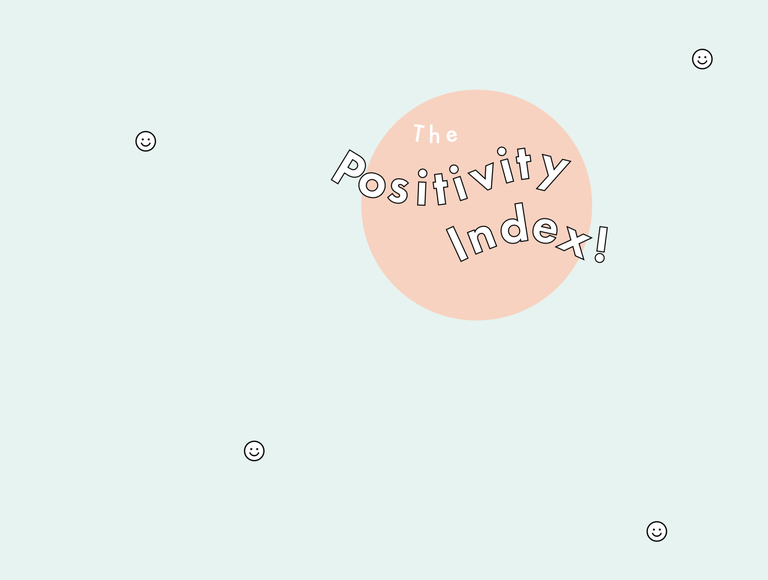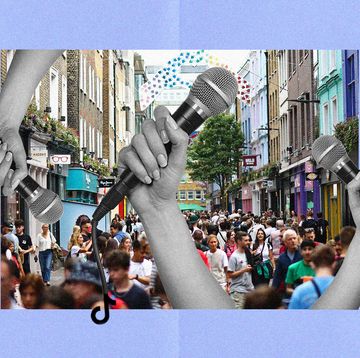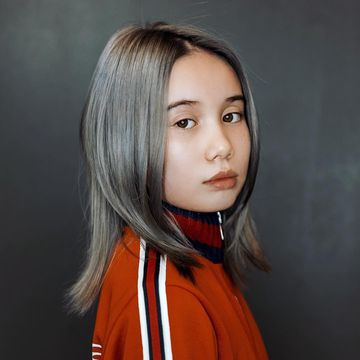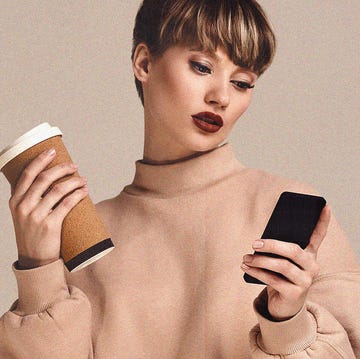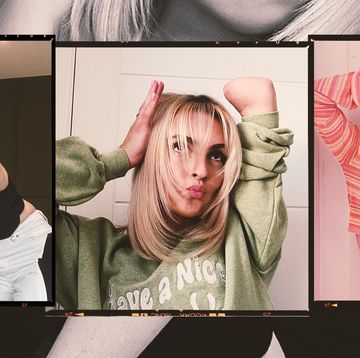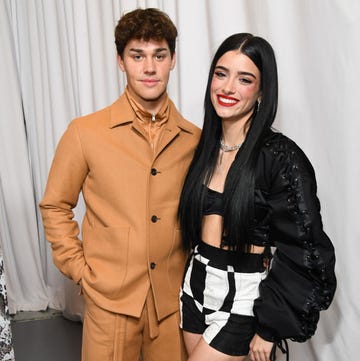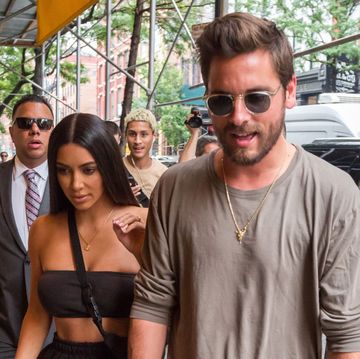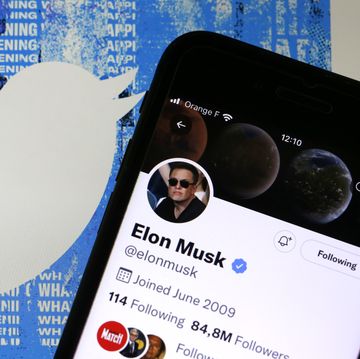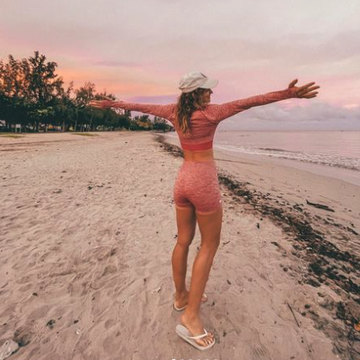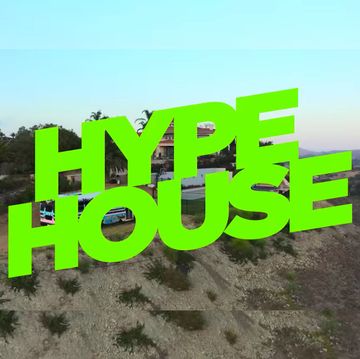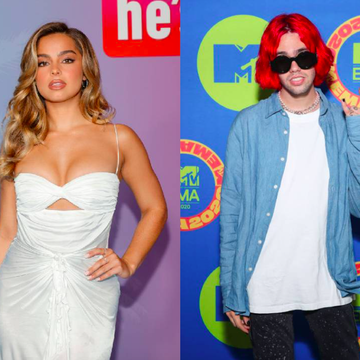We won’t go on about it (unprecedented, banana bread, social distancing etc.) but the last twelve months have been an emotional rollercoaster for us all. Being separated from loved ones has seen many of us spending a tonne more time on social media – meaning it’s more important than ever to have a beautifully diverse and uplifting feed to scroll through.
Back in the offline world, there are also plenty of heroes doing incredible (and genuinely life-changing) things to take note of too – so we’ve reunited with Instagram and anti-bullying charity Cybersmile to shout out all the change-makers, joy-bringers and people making our days just that little bit brighter.
Here’s a healthy dose of inspiration, motivation and tips for supporting causes you care about too, from a list of people we more than admire...
Marcus Rashford (@MarcusRashford)
Manchester United and England player Marcus is redefining what it means to be a multi-millionaire footballer. The star athlete could easily have stayed silent in the face of injustice and stuck to solely discussing sports on his social media account and in interviews – instead, he’s used his status and platform to raise awareness (and funds) for families experiencing food poverty.
“No child in the UK should be going to bed hungry,” he said when launching the End Child Food Poverty campaign last year. “Whatever your feeling, opinion, or judgement, food poverty is never the child's fault.” It’s something the star has sadly had first-hand experience of too – as do nine children in every classroom of 30 in the UK. Marcus has also used his voice to champion the BLM movement, having been impacted by racist abuse from fans personally, and is heralded as a credit to his sport.
Dr Alex George (@DrAlexGeorge)
Alex has many strings to his bow: busy doctor (he’s worked non-stop throughout the pandemic), reality star and now a mental health advisor to the government. After leaving Love Island, he could’ve pursued a different path, but instead Alex decided to dedicate his new-found celebrity to championing positive mental health and spreading helpful health-related information – a passion only further fuelled by the incredibly sad loss of his brother, Llŷr, who took his own life last summer.
But talking about mental health doesn’t always have to be a difficult and negative conversation, he says. “I post a lot about self-care routines; we need positive and uplifting messaging online.” Alex adds that seeing young people in particular tagging him in posts that show them “modifying their habits” and going outside for nature walks, is the most rewarding thing. He also advises avoiding your phone for an hour in the morning. “You’re opening the doors to your day and will be influenced by what you see. Set a happy tone offline first.”
Nicola Coughlan (@NicolaCoughlan)
Alongside the fact that Bridgerton provided us with much-needed entertainment throughout Lockdown 3.0, whenever Nicola personally posts on Instagram, we get a welcome hit of a dopamine (if she’s not dragging up for Zoom calls, she’s keeping it real in PJs). The actress is also a fierce crusader for equal rights, as well as an ambassador for LauraLynne House (Ireland’s only children hospice). To that note, Nicola says it can be difficult using your voice, but ultimately well worth it.
“Sometimes people will go ‘Well, why don’t you care about this or that too?’ – there are so many worthy causes to champion it can be overwhelming, but I can't know everything about everything. I just try to hold myself to my own standards and do my best.” As for what’s kept her upbeat throughout the pandemic, she says, “I try to focus on the positives, like being able to spend more time with my family.” Close pal Jonathan Van Ness would rank highly on Nicola’s own Positivity Index.
Stacie Swift (@StacieSwift)
Illustrator Stacie Swift, who focusses on “self-care and good vibes” was always happiest when holding a piece of paper as a child, be it a book or sketch pad. Now, she shares her work digitally too, to a following of almost 277,000.
“Growing up, my mum had mental health struggles and I was her main support. Combining those experiences with art is cathartic,” Stacie explains, adding that she uses her work to “process adulting and emotions, almost like a journal” ensuring her colourful and comforting pieces are relatable. If you're not yet familiar, picture a pink heart with the words ‘It’s OK not to do it all’ in the centre, or a ‘star of the week’ certificate awarded to ‘you for surviving these difficult and demanding days… keep going’. “I love seeing comments from people saying my post has validated how they’re feeling or put into words what they couldn’t quite say,” Stacie adds.
Dr Kemi Fabusiwa (@Dr.Fab)
When it comes to conversations about skin health, Black skin is often neglected. But Dr. Kemi Fabusiwa (AKA Dr. Fab) is determined to change that. “Black skin doesn't get sunburned, Black skin doesn't need SPF, Black skin cannot get rosacea – these are all myths,” she says. “Misconceptions can prevent people from taking proper care of their skin and aggravate other issues.” Dr Fab also believes in the power of representation. “It's important to recognise that darker skin, natural hair and wider noses… all of these features are beautiful and need to be promoted equally to the world.”
Sarah Lamptey (@SarahLamptey/@ShowerBoxLDN)
Having spent over a decade volunteering for various homeless charities, including with Crisis at Christmas, model and presenter Sarah knew she wanted to create something to help all year round: thus in 2018, ShowerBox (her portable shower trailer on wheels) was born. “People lose their lives to preventable illnesses because of poor hygiene and there’s a real stigma around being smelly,” she explains. “A simple shower can be truly transformative.” Sarah adds that in other countries there are public showers available in the streets, but we don't have anything like that in the UK – making it so much harder to be homeless in London than in, say, Paris.
For others wanting to make a difference, Sarah advises taking a practical approach and mixing it with a healthy dose of optimism and self-belief, “If your goal seems too big, break it down into smaller chunks... and if those chunks still seem too big, break them down again!” She also advises contacting those already doing something similar for guidance and to see if there's a chance to buddy up. “We work with Streets Kitchen and Tricky Period, for example.” ShowerBox always welcomes donations (and at the moment is looking for somebody to help out with their social channels too), to get involved drop Sarah a DM.
Glory Edim (@GuideToGlo/@WellReadBlackGirl)
Literature has long played a pivotal role in uplifting the Black community – it captures the beauty, nuances and challenges of being Black – and nobody understands its power better than Glory Edim, founder of @wellreadblackgirl.
On socials, Glory makes room for conversations about Black culture, politics, love and so much more explored in books by women of colour. Her brilliant book club has attracted hundreds of thousands of followers and some of the biggest names in Hollywood. “There are many micro-experiences that shift who we evolve into as women,” Glory said in one recent post. “Many of the most positive ones come from books that we read along the way.”
Ruby Rare (@RubyRare)
Sex positivity means different things to us all. For pink-haired sex educator and author Ruby Rare, it’s about enjoying her sexuality and fighting for wholistic, accessible education for all, while empowering others to do the same. Through her self-expression on social media, Ruby has cultivated a virtual 70,000-strong community overflowing with love and acceptance.
“I find by communicating in an open, honest and inclusive way, it helps people feel less alone when it comes to the challenges that we face in our sex lives. Something as simple as sharing a photo of me and my gorgeous belly rolls reminds others that they’re allowed to see their bodies as beautiful and full of joy.”
Dr Joshua Wolrich (@DrJoshuaWolrich)
Joshua started life online in 2016, by documenting his personal weight loss journey after medical school. “I used shame as a method of accountability,” he explains. “I’d amassed 30,000 followers from transformation photos, when I came across nutritionist Laura Thomas, who was speaking about intuitive eating and the damage that diet culture causes.”
After Joshua spent an afternoon asking her questions, he had a lightbulb moment. “I wanted to stop promoting weight loss and start fighting against weight loss stigma, I want to advocate for people who could be my patients.” Now, 358,000 followers rely on him for educational, thought-provoking content around nutrition, mental health and body image (all of which feature heavily in his new book, Food Isn’t Medicine, too).
Tilly Lockey (@Tilly.Lockey)
Tilly, who sometimes goes by the superhero-rivalling name ‘The Bionic Girl’ lost both her hands at the age of two due to Meningococcal Septicaemia Strain B – now she’s a body confidence crusader. Sounding wise beyond her fifteen years, she describes her Instagram page as “a nice, non-judgemental online space for myself and others”. Tilly adds that she’s grown into her confidence and enjoys helping others on their journey, “I’ve learnt that self-love is a marathon, not a sprint. Now, I like to accentuate my differences, I love that my arms have flashing lights and colourful cases that help me express myself.”
Wednesday Holmes (@hellomynameiswednesday)
Three years ago, Wednesday felt lonely – so they decided to talk about living with a chronic illness and being a non-binary lesbian through art. “I noticed documentaries kept telling us apps are bad for our mental health and wanted to do something to interrupt this endless cycle of harm,” they explain, alongside having a desire to fight against injustices and educate others. Now, Wednesday’s work (in particular their animated ‘Mental Health Checkpoints’ series) has reached millions and been shared by the likes of Kendall Jenner and Cara Delevingne. “They’re mostly personal reminders I set every day. I also use art as self-care, I sit and make all the time. I love it like nothing else.”
Zeena Shah (@HeartZeena)
An unrivalled colour queen – be it through her outfits and textile design work, or in her own home – creative Zeena is responsible for the #InstaRainbowChallenge (which later morphed into #ColourMeUpMonday) – which involved digging into your wardrobe and wearing something bright every day during Lockdown 1.0. “Colour has an incredible power and is able to do wonders for our mental wellbeing,” she explains. “My friend Natalie (@talliwall) and I wanted to remind everyone there’s no need to buy new and hoped to fill our feeds with colour, building a virtual rainbow and showing support for key workers. Over people 10,000 joined us.”
Carissa Potter Carlson (@PeopleIveLoved)
Artist Carissa unpicks all of the messy, complicated and beautiful emotions that accompany being human, drilling down into the crux of what love and life is really all about. “When I started in 2012, it made me feel less alone and more human when other people said they could relate to the feelings I had that were shameful or guilty,” she says. “It was therapy for me. I wish I could be more strategic about it, but I think the situations we all go through seem so dramatic and personal in the moment, that it’s easy to forget that our experience is universal.”
She praises her family and partner, Josh, in particular for getting her through the pandemic and allowing her space to create, as well as compiling mental lists first-thing in the morning, about what might bring her joy. “Singing with my sister, walks with my dad, snack time with my baby, seeing the roses bloom.” Small – but important – wins. Carissa is especially excited about the release of her new book, How To Heal Heartbreak, too.
Maddy Lucy Dann (@MaddyLucyDann)
Maddy Dann may playfully describe herself as a “master of none”, but that couldn’t be further from the truth. The A&E doctor turned comedian posts hilarious TikTok videos that capture the realities of her everyday life. “I love to tell stories and interact with people,” she says. “Social media is the most accessible way to do it. And I get so much fun out of it. That's really my driving force.” On socials, Maddy embraces everything that she is, and has been supported for it. “I’m blown away by the response I’ve gotten. It’s a lovely reminder that as women we can wear different hats!”
Tori Tsui (@ToriTsui_)
As a queer woman of colour who lives with chronic conditions and advocates for better mental and environmental health, Tori also uses her growing platform to encourage important conversations about intersectionality within fighting climate change. Through initiatives such as Pass The Mic Climate (urging influential figures and brands to share their platform with activists) and Bad Activist Collective, she fosters communities of people from all backgrounds who care about our planet. “I often speak on the dangers of having cults of personality spearheading movements,” Tsui says. “Centring the most privileged activists creates movements that aren’t just or inclusive.”
Tsui’s learnt plenty from social media about fighting the good fight: “There’s ample opportunity for activists to learn online. It’s also allowed us to understand the importance of direct action and campaigning, as we need on the ground mobilisation to achieve climate justice.”
Malin Andersson (@MissMalinSara)
‘I fight for the causes that pain me’ isn’t just Malin Andersson’s Instagram bio, it’s who she is. After Love Island, Malin forged a new path of helping others (and herself) heal. “When my little girl passed away, I really lacked purpose in my life,” she shares, discussing the tragic loss of her daughter, Consy, one month after her birth in December 2018. “When I started to talk openly about what I was going through on socials and realised that it was reaching more people, I felt so much more understanding of where my life was going.”
Malin doesn’t shy away from the hard topics. In fact, she runs toward them, understanding that when tough conversations are initiated that’s when recovery begins. “Let's talk about child abuse, or child trafficking. Let's talk about the stuff no one wants to talk about.” Now, Malin wants to use her platform to uplift others. “I’m focusing on my podcast and giving other people's stories airtime. I want to give a voice to those that don't have one.”
Sophie Williams (@officialmillennialblack)
Communicating the complexities of Black experiences is no simple task, but that’s exactly what multi-hyphenate activist Sophie Williams has done by creating Millennial Black. “I made some text-based posts about allyship, which really took off, and in just a few weeks I had over 100k followers,” she says. Want to lend your voice for change on socials? “Post about the things that matter to you,” advises Williams. “It’s really important you don’t feel like you’re too small to make a change.”
Izzie Rodgers (@IzzieRodgers)
Acne and body confidence advocate Izzie Rodgers uses her platform – which has attracted over 50,000 followers and the attention of major beauty brands – to celebrate her beauty, encouraging others to do the same. “Acne is normal and this is your life to live,” she says. “You have the right to embrace and love yourself no matter what... and I’ll preach this until I can’t preach anymore!” Rodgers does receive backlash online, but to combat the negativity, she ensures she’s in control of her social media consumption. “I [also] remind myself it’s OK to not feel OK with this volume of judgement."
Professor Sarah Gilbert
You might not know her name, but you’ll definitely know her work: Sarah spearheaded the team that designed the Oxford Vaccine, providing hope for millions. Despite almost stepping away from science while studying for her PhD (“I was working hard and not outwardly making much progress, but I don’t like leaving things unfinished,” she says), Sarah has risen to become one of the country’s brightest brains.
She cites her former biology teacher as inspiration, “They instilled in me the need to understand things thoroughly and not be content with a superficial understanding” as well as a PhD colleague, “[They were] never daunted by a seemingly very large task. From those two examples, I took the directions for the way I work. In the last year, it’s been about both doing everything that could possibly be done – and then not stopping.” Next up, she hopes to close the gender gap in senior academic positions.
Oti Mabuse (@OtiMabuse)
When lockdown first hit, Strictly legend Oti wanted to help, but didn’t know how. “I felt strongly about giving back. I wanted to volunteer but a doctor told me the best thing I could do was to stay home,” she explains. “So, I started online dance classes with my friend Karen [Hauer] for kids.”
Now, Oti can do as many as three in a day, with all ages and levels joining in. She’s also held a virtual event too (with plans for more in the future) to connect and empower women. “That day I danced, shared affirmations, braided my hair, cooked for my husband, cared for my dog and did the event. We’re all wonder women!” Oti never feels the pressure to post online, seeing social media solely as fun and a good way to share her work, adding wisely, “While I don’t feel I need boundaries with my phone, I do with people.”
Khalia Ismain (@UKJamii/@KhaliaIsmain)
“Everyone loves a discount!” laughs Khalia, founder of Jamii, an online marketplace, discovery platform and discount card for Black-owned businesses. It launched in 2018 with a mission to help people quickly find new brands (from skincare to greeting cards). “We’re changing long-term spending habits,” she explains. “The second Black Lives Matter movement last summer showed that people have good intentions and want to support Black businesses, which in turn create jobs within communities at an economic disadvantage, but you have to make it easy for them.”
Social media has been integral for developing Jamii and getting customer feedback too. “I didn’t start with a small budget, I started with no budget… but social media is free!” says Khalia. “Even when our website wasn’t the best, we grew. People gravitate towards your ‘why’, not your ‘what’.”
Jemma Finch (@StoriesBehindThings)
Stories Behind Things initially started as a passion project for sharing tales about pre-loved clothes, then grew into a platform to celebrate and explore sustainable consumption on a deeper level. “We create content and provide insights for a community of humans passionate about living in line with their values every day,” says its co-founder and CEO, Jemma. “We do this both on and offline, through events, panels, clothes swaps and more.” The key is to be a solution-led and positive space, she explains. “Provide small and meaningful changes that your community can make with you every day.” We love following for a non-preachy reminder that new doesn’t necessarily mean better.
Nina Tame (@NinaTame)
Sweary, entertaining and no bullshit, disability activist Nina provides the perfect combination of envy-inducing outfits (see that Dolly Parton jacket for details) and education. Born with Spina Bifida, Nina says she’s “always been disabled, but didn’t step into that identity until three years ago” when she started using a wheelchair. Since then, she’s shared her lived experiences online (“Don’t call me ‘inspirational’ just because I’ve left the house”), highlighted ableism and smashed stereotypes.
Humour is her weapon of choice: “There’s a fine line between calling out and alienating people, which I don’t want to do. People relate to what I’m saying more if it’s wrapped up in a humorous way.” For others looking to support the disabled community, she recommends searching #DisabledAndCute, #BabeWithAMobilityAid and #AbleismIsTrash.
Milly Pickles (@MillyPickles1)
Life changed for Milly in September 2017, when an accident left her fighting for both her legs and her life. “I lost half of my right leg, had 25 surgeries and more than half my hair fell out,” explains. “I had to relearn to walk, but I embraced this as I was keen to get back to my life. I was – and am – just so grateful to still be alive.” Milly adds that she’s now learning to run and loves sharing her journey online, inspiring others along the way. “When I lost my leg, I searched for another young female amputee to relate to but struggled to find someone. Now, I hope to be that person for others. Three years on, I am my happiest self.”
Reframe your feed
How to make your Instagram a more positive place, with help from Cybersmile
Practise mindful scrolling
In your Instagram settings, you can seta “daily reminder” and choose how long you want to spend scrolling per day –you’ll get an alert when you hit that limit.
Manage your DMs
On Instagram, you can change your privacy settings to allow only people you follow to directly message you.
Be considerate
Instagram’s AI-powered feature lets you know if a comment you’re writing maybe considered offensive before you post it, giving you a chance to reflect and chooseto be kinder or more sensitive.
Get strict with restricting
Restricting someone means their comments on your posts will only be visible to you and them (not your other followers). They also won’t be able to see when you’re online, or when you’ve read their messages.
Hit mute
The mute button is a good option if you don’t want to unfollow someone, but would prefer to decide when you do – or don’t– see their content. The person won’t be able to see that you’ve muted them.
Curate a joyful feed
Remember, you are in control of your feed– follow accounts that make you feel good.
Control your comments
If comments on your posts that use certain words, phrases or emojis upset you, you can use Instagram’s filter tool to hide these. You can also disable comments completely on any of your posts.
Block out negativity
Switch on Instagram’s feature that hides potentially harmful comments – these are identified through AI, based on those that have been reported previously.
The latest issue of Cosmopolitan UK is out now and you can SUBSCRIBE HERE.
Sign up to our newsletter to get more articles like this delivered straight to your inbox.
Jennifer Savin is Cosmopolitan UK's multiple award-winning Features Editor, who was crowned Digital Journalist of the Year for her work tackling the issues most important to young women. She regularly covers breaking news, cultural trends, health, the royals and more, using her esteemed connections to access the best experts along the way. She's grilled everyone from high-profile politicians to A-list celebrities, and has sensitively interviewed hundreds of people about their real life stories. In addition to this, Jennifer is widely known for her own undercover investigations and campaign work, which includes successfully petitioning the government for change around topics like abortion rights and image-based sexual abuse. Jennifer is also a published author, documentary consultant (helping to create BBC’s Deepfake Porn: Could You Be Next?) and a patron for Y.E.S. (a youth services charity). Alongside Cosmopolitan, Jennifer has written for The Times, Women’s Health, ELLE and numerous other publications, appeared on podcasts, and spoken on (and hosted) panels for the Women of the World Festival, the University of Manchester and more. In her spare time, Jennifer is a big fan of lipstick, leopard print and over-ordering at dinner. Follow Jennifer on Instagram, X or LinkedIn.
